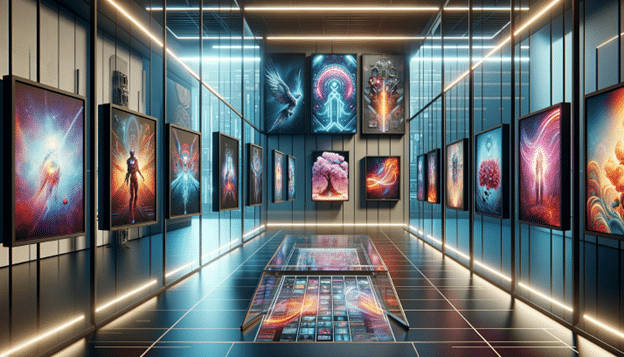12/12/2023 2023 Recap: What Happened To NFTs?
 What Happened to NFTs
What Happened to NFTs
Introduction
The year 2023 marked a period of recalibration for Non-Fungible Tokens (NFTs) following the monumental hype they garnered in the previous years.
As the dust settled, the focus shifted from mere speculation to a more grounded assessment of value and utility.
This recap byThe Crypto Basic, a prime source for crypto news and DeFi topics, seeks to traverse through the key happenings in the NFT space over the year, evaluating the highs, the lows, and the emergent trends that are likely to shape the trajectory of NFTs moving forward.
NFTs: From Riches to Rags
The fervor around NFTs saw a significant dip as market corrections took place; the illiquidity in many NFT projects became apparent, with about 70% having a floor price of zero over the last six months leading to April 2023.
The decline in liquidity was notably sharp post-April 2022, bottoming out in September before showing signs of recovery in the first half of 2023.
● How Did We Get Here?
The initial NFT euphoria was driven by speculative trading, high-profile sales, and a rush of new projects entering the market.
However, as the market matured, the disparity in quality and value among projects became evident.
The concentration of market cap within the top 1% of NFT projects highlighted the skewed distribution of value, with these projects holding over 50% of the total market cap.
The competition among NFT marketplaces intensified, with platforms like Blur and OpenSea engaging in a “royalty war” to attract creators and buyers; this war led to a significant reduction in marketplace fees, impacting the overall revenue generation from royalties.
Notably, Blur overtook OpenSea in royalty market share, showcasing the dynamic and competitive nature of the NFT marketplace arena.
What Is the Future of NFTs?
The future of NFTs lies in the evolution of utility, diversity of assets, and integration with broader digital ecosystems.
Here are some key trends and developments that have been observed in 2023, setting the stage for the future trajectory of NFTs:
● Emergence of Utility-driven NFTs
The narrative has started shifting from collectibles to utility-driven NFTs; these tokens are now being used to represent a variety of assets and access rights in the digital world, ranging from virtual real estate and gaming assets to memberships and even digital identities.
For instance, Decentraland and The Sandbox have seen a growing community of users trading virtual real estate assets, while games like Axie Infinity continue to thrive on player-owned economies.
● Cross-platform Interoperability
Cross-platform interoperability emerged as a notable trend, allowing assets from one platform to be utilized in another.
This interoperability is fostering a more integrated and cooperative digital asset ecosystem; for example, projects like Polkadot and Cosmos are working towards creating interoperable protocols that will allow NFTs to be traded across different blockchains.
● Integration with DeFi
The integration of NFTs with Decentralized Finance (DeFi) platforms is another exciting development– by tokenizing real-world assets as NFTs, individuals can now use these assets as collateral to obtain loans or earn interest through various DeFi platforms.
This integration is bridging the gap between traditional finance and the crypto world, creating new opportunities for asset monetization and financial inclusion.
● Enhanced Legislation and Regulation
As the NFT space matures, so does the regulatory landscape surrounding it; countries are beginning to outline regulatory frameworks to ensure consumer protection and to promote a healthy market environment.
This includes measures to combat money laundering and ensure the authenticity and provenance of digital assets.
● Evolving Market Infrastructure
The market infrastructure is evolving to accommodate the growing and diverse needs of NFT creators and investors.
New marketplaces, better user interfaces, and more robust auction mechanisms are being developed to enhance the user experience and to cater to a broader range of digital assets.
Conclusion
The trajectory of NFTs in 2023 reflects a maturing and evolving landscape, moving beyond the initial hype towards establishing a robust infrastructure and a broader utility spectrum, as seen by our crypto news coverage.
As regulations catch up and technological advancements continue to foster cross-platform interoperability and DeFi integration, the stage is set for NFTs to become an integral part of the digital economy.
The lessons learned from the market corrections and the evolving narrative around utility and value are likely to guide the development and adoption of NFTs in the years to come.
 (0)
(0)
 (0)
(0)
https://thecryptobasic.com/2023/12/10/2023-recap-what-happened-to-nfts/
